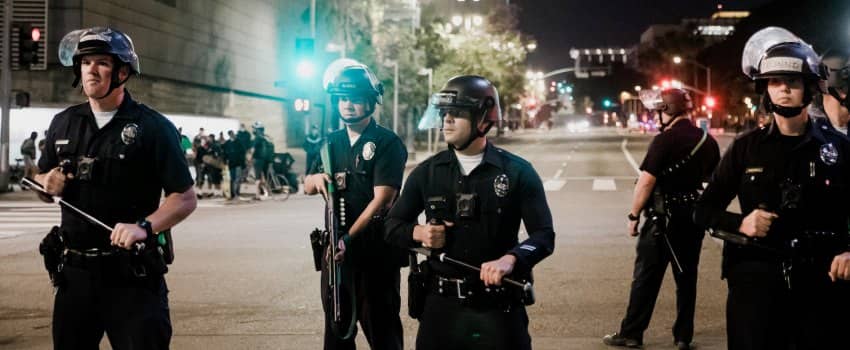Felony vs Misdemeanor in Georgia

Felony Crime vs. Misdemeanor, Infraction
This article provides definitions of felony, misdemeanor, and infraactions in Georgia. Learn the differences, potential punishments and consequences.
Felony or misdemeanor? In Georgia, as in other states, crimes are generally categorized as a misdemeanor or a felony. The distinction is generally based on their seriousness of the actions deemed to be criminal offenses.
From the perspective of the person arrested, the key differences between a misdemeanor and felony in Georgia is the potential penalties and consequences if found guilty of the charges.
What is a Misdemeanor in Georgia?
Misdemeanor charges and crimes are offenses of a less serious nature.
The Brittanica.com website defines the difference in this way, "A felony is typically defined as a crime punishable by a term of imprisonment of one year or more. Misdemeanours are often defined as offenses punishable only by fines or by short terms of imprisonment in local jails."1
What is the most common punishment for a misdemeanor?
Per the Cornell.edu website, the range of punishments for misdemeanor crimes is as follows: "Community service, probation, fines, and imprisonment for less than a year are commonly issued punishments for misdemeanors. More grievous crimes, felonies, carry stiffer penalties, including jail time of more than 12 months." 2
Common examples of misdemeanors in Georgia include shoplifting, simple assault, disorderly conduct, and loitering.
Generally speaking, the following applies to felony crimes in Georgia:
- They are typically punishable by a maximum of 12 months in county jail.
- Misdemeanors can be categorized into two classes: Misdemeanor of a high- and Misdemeanor of a low-grade.
- The maximum penalties vary depending on the specific class.
What is a Felony in Georgia?
Felony charges and crimes are the most serious types of crimes.
The GeogiaCourtRecords website describes a felony crime as: "The Georgia legislature classifies felonies as the most serious crimes in the state. These crimes are punishable by a minimum of one year imprisonment as opposed to misdemeanors and infractions. In addition, most of the crimes under the “serious violent felony” category have the minimum penalty of 25 years imprisonment and a maximum penalty of a death sentence. Punishment may also include probation, fines not less than $1,000, or other mandatory sanctions imposed at the discretion of the judge" 3
Generally speaking, the following applies to felony crimes in Georgia:
- They are punishable by more than 12 months in state prison. The length of the sentence can vary significantly, and some felonies carry a potential life sentence or even the death penalty for particularly heinous crimes.
- Common examples of felonies in Georgia include murder, rape, aggravated assults, armed robbery, and drug trafficking.
- Felonies are also categorized into different classes based on their severity, i.e., first degree, second degree and third degree. The penalties for each felony degree vary significantly.
Georgia, like many other states, has specific sentencing guidelines and a structured criminal justice system that determines the exact penalties for each misdemeanor or felony offense. The circumstances surrounding the crime, the defendant’s criminal history, and other factors may also influence the final sentence imposed.
What are Wobbler Laws in Georgia
Georgia laws include crimes that can be prosecuted, depending on the case facts, as a misdemeanor or a felony. The legislation that makes this so is referred to as "Wobbler law". In these circumstances, a judge can impose a misdemeanor sentence for a felony which has a sentence for ten years imprisonment or less. A judge can also apply harsher sentences for some misdemeanor cases.
Examples of Wobbler crimes in Georgia are:
- DUI and BUI
- Identity Fraud
- Forgery
- Trespassing
- Vandalism
- Stalking
DUI Misdemeanor or Felony?
In Georgia, a DUI offense may go down as a misdemeanor or a felony. The circumstances of the case will determine which way it goes. As for consequences, depending on your situation, you could be facing a combination of loss of driver’s license, fines, community service, jail or prison time, and probation. Additionally your car insurance costs will increase and you may be required to have an interlock system installed on your car.
What kind of factors in a DUI can bring felony charges? The first-third DUI charges are usually prosecuted as a misdemeanor, and have increasingly tougher sentences. A fourth DUI is a felony, and the consequences are relatively heavy. The skill of yourDUI Lawyer has a huge effect on the outcome of your case.
Whether it’s directly tied to driving under the influence,or it’s an additional charge, many DUI’s result in felony convictions. A few common aggravating factors in a DUI arrest are hit-and-run, vehicular homicide, endangerment of a minor, and possession of illegal substances.
Infractions in Georgia
As far as other offenses for which you may be cited, these are termed infractions. An infraction is neither a misdemeanor or a felony but is considered problematic behavior.
Per the GeorgiaCourtRecords website: "An infraction is a petty offense of less gravity or seriousness than misdemeanors and felonies. Infractions are basically non-criminal violations of a law, statute, code or registration created by a government body. Penalties of infractions in Georgia do not require prison time and are basically in the form of citations and fines, with few other warnings or sanctions"4
If you’ve been charged with a misdemeanor or felony we encourage you contact a defense lawyer. Let us help you to understand what you’re facing and introduce how we can help you. Call us at 678-880-9360.
CREDITS and FOOTNOTES
- 1 Staff Writers, "Felony and Misdemeanour", March 3, 2022, Available from Brittanica.com
- 2 Staff Writers, "Misdemeanor", August 11, 2021, Available from Cornell Law School
- 3 Staff Writers, "Felonies, Misdemeanors and Infractions in Georgia", February 13, 2022, Available from GeorgiaCourtRecords.us
- 4 Staff Writers, "Felonies, Misdemeanors and Infractions in Georgia", February 13, 2022, Available from GeorgiaCourtRecords.us
- Photo by Sean Lee, available at Unsplash


